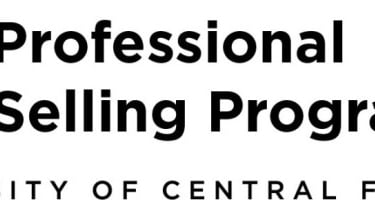Why Sales?
I chose to focus on sales by joining UCF’s Professional Selling Program because I believe that strong communication and relationship-building are at the heart of every successful business. Professionally, PSP will expand my leadership, communication, and management skills, which will contribute to my growth and help me set an example for future generations of business professionals. The program’s emphasis on real-world selling, strategic thinking, and ethical leadership aligns directly with my goal of running a successful business. Whether I’m working with clients, leading a team, or building a brand, the skills I develop through PSP will equip me to lead with confidence, effectively connect with others, and grow a business founded in purpose and professionalism.
What is the Professional Selling Program?
The Professional Selling Program at UCF is a highly selective and respected track within the College of Business. Each year, up to 35 students are selected for the program based on their potential to succeed in sales. The year-long program offers hands-on training in areas like selling, sales management, and strategy. Students take specialized courses and are paired with a professional mentor to support their growth throughout the year. PSP is designed to prepare students for real-world success and give them a strong edge in today’s competitive job market.
Relevant Courses:
Professional Selling:
Marketing Analysis:
Marketing Research:
Understanding the sales process from prospecting to closing
Developing effective communication and active listening skills
Building rapport and trust with clients and prospects
Identifying customer needs, pain points, and decision-making factors
Crafting and delivering persuasive sales presentations
Overcoming objections and handling buyer resistance
Learning techniques for negotiation and closing the sale
Collecting and interpreting market research data
Understanding and applying consumer behavior insights
Conducting competitive analysis to evaluate market position
Using data visualization tools (e.g., Excel, Tableau) to present insights
Utilizing surveys, focus groups, and observational methods for data collection
Making data-driven decisions through statistical analysis and forecasting
Measuring brand awareness, customer satisfaction, and market trends
Understanding the role of marketing research in business decision-making
Defining research problems, objectives, and hypotheses
Designing effective research methodologies (qualitative and quantitative)
Developing and using surveys, questionnaires, and interview guides
Conducting primary and secondary research
Collecting, cleaning, and organizing data for analysis
Applying statistical techniques (e.g., regression, cross-tabulation, correlation)
Interpreting and reporting research findings to guide strategy
Using tools like SPSS, Qualtrics, or Excel to analyze data
Relevant Books:











